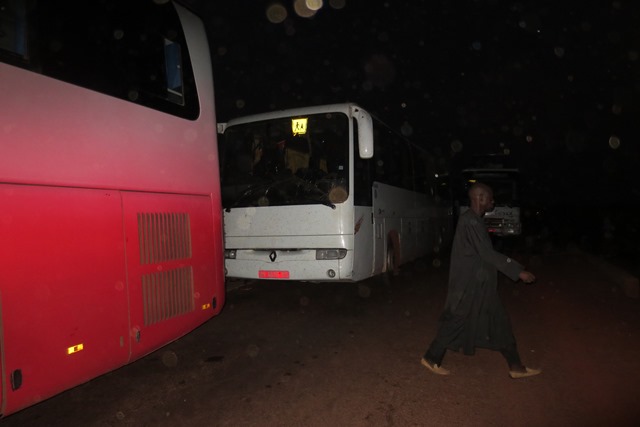About 20 vehicles are lined up along the road. Children are rushing to the passengers to offer them mats to rent at 200 francs CFA for the night as well as bottles of water drawn from the well that sell for 100 francs CFA. At the foot of the cars, mats are spread out as far as the eye can see.
Tea, hot Quinqueliba sell for 50 francs the glass and the bowl. A small fair full of small traders. It is night, darkness begins to spread its thick veil on this place that looks like a forest. Only a few torches and small lamps make it possible to see the few houses
scattered here and there on both sides of the road. Welcome to Djenne intersection!
At about 100 km and a few kilometers from Mopti, this intersection is now a stopover point. Djenne intersection even managed to shade the village of Lafiabougou, mainly composed of Bellah, Fulani, Sonrhaï, Tamasheq, which is a few meters away.
Madou knows the road to Mopti like the bottom of his pocket: it has been 15 years since he is a driver. He confides his annoyance to see that the passengers still have to spend the night in the open air. On both sides of the road, a roadblock installed between 6 pm and 6 am by the Malian military prevents from continuing to Mopti and the other parts of the north. A decision taken by the Malian authorities because of the deterioration of security conditions in the center of the country, now the epicenter of terrorism and plowed by social conflicts.
For nearly three months, it is forbidden to drive the night by motorcycle between the villages. “We are fed up. This roadblock is not a good idea at all. Drifters can fall on us here at any moment”, he rants, the cigarette screwed to the lips. Another fear, he said, is the loss of luggage that often occurs in buses most of which are not locked. “Who pays? The driver? He asked, opening his eyes wide.
Meanwhile, one of his apprentices wanted to enter the bus to take a bunk. Madou opposes him with a categorical no, no question of opening the bus tonight again. It is a principle on which it does not procrastinate. Among the drivers we interviewed, there are many who feel that passengers are not safe in this place.
“Before, says Abba, the soldiers came walking between the passengers here. But for some time now they have stopped doing this. Reinforcements also came in the evening, but we don’t see them anymore. Here it is everyone for himself, God for all! Abba lived in Bamako, the capital, which he left to return to Lafiabougou, to open a “grill” there. This situation, recognizes the young man, 28 years old, is like blessed bread for him but “on the other hand the passengers are suffering, and nobody wants to live that”, is sorry the one who managed a shop selling telephones in Djelibougou, a popular neighborhood of Bamako. Beside him, Amadou, seated behind a stall filled with eggs, coffee, powdered milk, says: “No one is safe here. We can all come and kill us.”
Ibrahim has just rented a mat. He did not expect to experience such a situation. “It’s terrible” he says, noting that this crowd that is constantly growing and where, he suspects, it is possible to find jihadists. Renting mats has become a business for old Baba, a bobo.
His eldest son sells tea at 50 francs a glass. There are days when, he confides, he can generate in this trade profits ranging from 2500 francs to 3000 francs CFA. “I pay for charcoal at 100 francs, 500 francs go into tea”, he explains. Ibrahim orders a glass of tea, which he will take to stay awake. He cannot sleep here.
Just a few steps away from the spot where the vehicles are parked, only the light of a few bulbs allow to see the soldiers who control the roadblock at the water-and-forestry checkpoint. The instruction is clear: no one will pass before 6 am. Amadou explains that even to go to the village, a few meters away, the villagers are forced to take a clandestine way in the bush. Otherwise the soldiers will order them to turn back. The post underwent two attacks by the jihadist groups who are scouring the area. The third attack targeted water-and-forestry officers 4 km south of Djenne intersection. Assessment: one agent killed, another left in coma.
At 2 o’clock in the morning, the atmosphere is always good. The passengers are here, mostly lying down. A pestilential odor is coming from the bush. Without toilets, the passengers take refuge there to pee, defecate. In this place, promiscuity is guaranteed. But it is easy to pin down fear in words. A water-and-forestry officer reassures, however: “These people only target the military and not the people. Otherwise, it was going to be a carnage here.”

